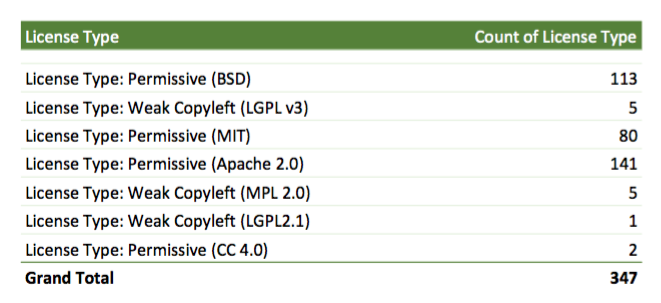Home - Teleport Blog - Keeping Track of Open Source Software Licenses - Oct 18, 2016
Keeping Track of Open Source Software Licenses
Introduction
A few weeks ago we attended a dinner hosted by Lightspeed Ventures for technology leaders in the Bay Area. At the event, someone proposed that each guest share a simple (but useful) bit of advice for other tech companies in the enterprise software space.
One of the wisest bits of advice was:
Get your software licenses in order EARLY and save yourself from a world of pain later.
Indeed. This is a lesson we had also previously learned. In this post I'll share our experience heeding this advice with our quickly evolving codebase.
TLDR;
- "FOSS" is free, but has implicit costs.
- This "cost" usually comes up at the most critical times, like an acquisition offer or large customer deal.
- Review all licenses before using - tell your team to do the same.
- If you have not been actively doing this, here's a script to scan and categorize them.
- If there are any copyleft licences, be especially vigilant.
- Talk to a lawyer to make sure you are not infringing on other's rights.
Standing on the shoulders of giants
All of us in the software business owe a lot to our predecessors. The amount of free and open-source software ("FOSS") code that can be leveraged when building a new offering is staggering. From a simplistic (and perhaps cynical) perspective, many SaaS products can be thought of as:
SaaS = dash of business logic code + tons of existing FOSS + ops blood, sweat and tears
However, while all of that FOSS you are using may be free (monetarily), there could be implicit costs. This post will touch on what to watch out for and tips for keeping your code base clean, legally.
Open source != public domain
As a startup, it may be tempting (while you are rapidly moving around, breaking things) to pay little heed to the types of FOSS you are using. However, just because something is open source does not mean it is free for you to use, willy nilly. Those licenses that are included with each FOSS library matter and they REALLY matter at the most crucial times...like being acquired or signing a large deal.
The likelihood of this becoming a problem is correlated with your success and notoriety, so many startups do not focus on this when they are just getting started.
But imagine spending several years toiling away at your startup and against all odds you build it into something that someone else actually wants to buy...yay! Well, the acquirer will do several types of due diligence before writing that check, one of which is intellectual property due diligence. As part of that due diligence, if they find you are infringing on someone else's rights, they will tell you that they can not buy your company while you are doing that. It would be a huge bummer to have something as banal as this scuttle the deal.
IANAL, you should talk to a lawyer
Before we get into it, the first obvious piece of advice is to talk to your lawyer (I am not a lawyer). Unfortunately, lawyers can be pretty expensive so many people will put it off until it's too late. Do not do that. Treat this post as some free, amateur advice to help you engage with your lawyer in a more educated manner.
I won't go into the intricacies of software licensing but here are a few tips, links and tools to help you get started.
General overview of FOSS
Software licenses evolved out of copyright law and in particular the protections that an author has to his or her original works. This incentivizes people to spend their precious time creating cool stuff...because then they own it. Software is classified under literary works since you are, in fact, writing that code. The main protection authors have is that they get to determine how they distribute their works to other people and what those other people can do with them. The license is the document that tells others what they can do with the author’s work.
In the software world, most of the open source licenses you will encounter are Permissive or Protective/Copyleft.
This is a massive over simplification so here are some resources to learn more:
- A good trail head for your Wikipedia journey
- An awesome reference of most software licenses and what you need to worry about in plain english
- A list of the most popular software licenses
Most permissive licenses let you use and redistribute the code freely (with some having a requirement that you reference the original copyright). A Copyleft license will have additional requirements, a common one being that you have to use that same license to distribute what it is included with. For this reason, Copyleft licenses are sometimes pejoratively referred to as viral licenses since they infect and limit how you can license the resulting code base. Out of the top five most popular licenses, the GNU licenses are Copyleft licenses.


Source: BlackDuck
The main takeaway is that if you want to sell your software or even open source it, you may be infringing on the original author's rights if you have are using any software with a Copyleft license.
So, here are some simple ways to help avoid this:
- If you are just getting started, read the license before using that code in your project. As you build your team, make sure it is part of your team's workflow.
- For existing projects, scan for licenses (including any dependencies those projects use) and review them to make sure you aren't already using a protective license.
- If there are any Copyleft licenses, you need to further evaluate that you are not violating them. I’d suggest starting with TLDR Legal and refer further questions to your lawyer.
License scanning process
We recently went through this process and wrote a script that scans our github repository for license files and categorizes them based on fuzzy matching. This substantially reduces the time it takes to review the licenses. Here's the script (with a permissive license :).
After the initial scan, we manually reviewed them to make sure there were not any errors in the matching. For any licenses that were not permissive, we made sure we are complying with the terms of the license. Thankfully, there were only permissive and weak Copyleft licenses which generally means it is ok if you are just linking to them and not modifying them to create derivative works.
The results of the analysis are here:


As you can see, these licenses add up quickly so it’s good to keep an eye on them.
Teleport cybersecurity blog posts and tech news
Every other week we'll send a newsletter with the latest cybersecurity news and Teleport updates.
Third party services
There are a number of third party services that will help with this process, including traditional vendors like WhiteSource and Blackduck.
Another new and promising entrant to the market, and one I wish I found before going through the steps above, is FOSSA. They actually run the TLDR Legal site and they make it really easy to get started. Their product also allows you to create policies and it will analyze your repos dynamically, each time you commit. Finally, they have nice integrations with issue trackers, like Jira, to check off any issues as you resolve them. I went through the same process with their private beta and I was really impressed by how much easier it made the process.
Conclusion
This is not the most exciting side of software but it is something that can hurt your business and damage your reputation if you are not careful. You can alleviate a lot of anxiety at critical moments by instituting some minor controls early in your development process to make sure you are not infringing on others' rights.
Tags
Teleport Newsletter
Stay up-to-date with the newest Teleport releases by subscribing to our monthly updates.

Subscribe to our newsletter

